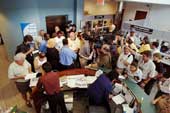 |
The moment Riya (23) joined the party, she wanted to get out of the place. She could not stand being there and this was not the first time she felt ?uncomfortable? in a congested place. An unknown fear crept in her and she frantically searched for an ?escape route? from such situations.
Doctors diagnosed Riya?s case as claustrophobia ? the fear of being trapped in a congested places. A more accurate description of claustrophobia, however, is ?the fear of not having an easy escape route?. All those suffering from the disorder display this predominating feature ? thet feel the urge to be able to get out of the situation. Some also experience panic attacks at the time when they are trapped. Doctors call it as an ?irrational fear? of having no way out?.
Some people who go through a period of having panic attacks begin to become very focussed on the need to be able to get home quickly so they begin avoiding any situation where the route home will not be quick and easy.
?An irrational fear creeps into the person's consciousness and he starts not only dreading, but also avoiding such situations,? says Ashok Patnaik, head of Tata Hospital?s department of neuro-psychiatry.
Occurrence
Claustrophobia is very common among the general population. ?In India, five to six per cent of the population suffers from this fear.? says Patnaik. ?This fear can occur in any age group of people. However, the percentage of its occurrence is more in females.?
There are various reasons for this phobia. Many people develop this condition after being ?trapped? at some point in the past ? those who have been stalled in elevators or been a part of a frightening plane journey.
Symptoms
Those suffering from Claustrophobia are likely to display signs of anxiety, choking and palpitation. There is also extreme sweating when a patient is in such a situation. The affected tends to drink a lot of water and at times there is a feeling of weakness. Patients also find it difficult to concentrate and there is a marked increase in the frequency of urinating, burning sensation in eyes, loss of appetite and sleep and a sensation of extreme cold or hot. Being in such a situation can be uncomfortable, embarrassing, inconvenient and even debilitating at times. Doctors, however, say just as one can learn to have a particular response, one can also un-learn it ? any kind of fear can be treated, but it should be attended before it becomes a disorder.
Tracing the roots
Some experts attribute an individual?s genes for developing the problem. ?Some literature available also says that in some cases, this problem has been inherited and chromosonal abnormality can also be a reason for this disorder,? says a leading city-based neuro-psychiatrist. In many cases, biological abnormality has been seen as root cause for claustrophobia, Like it is not necessary for everybody to react similarly. Doctors say the brain multiplies a fear into an irrational fear and any effect that exceeds the limits can become a disorder. Moreover, how a some one reacts to a given situation depends entirely on his personality. ?Fear is a chain reaction ? it only grows if not attended at the right time,? says Patnaik.
Psychoanalysts say claustrophobia is the impedance in one?s actualisation needs. Another school believes that when the ego fears the id in our brain, it takes control which results in any kind of phobia or fear.
Treatment Route
Both pharmalogical and non-pharmalogical cure is available for claustrophobia. Anti-anxiety and anti-depression drugs can also be an effective cure. Claustrophobia can be treated with a good package of drugs and psychotherapy. A wide range of medicines are is available in the market and they help normalise the disorder of the neuro-hormones.
Doctors usually prefer psychotherapy for this problem. One of the most effective ways is the ?relaxation technique?, which is expensive and time consuming. ?Drugs can keep the persons happy, but does not solve the problem within the subconciousness,? says Patnaik. Another cure is ?flooding?. ?A person is exposed to the dreaded situation till he gets control that fear. This practice is rarely followed now,? says Patnaik.
Reassurance is another important ingredient to treat this problem. A person needs to be assured of recovery. Doctors also say a proper diet and good sleep is extremely essential.
Good professional help is likely to make things easier and quicker, but, for most people, claustrophobia can be treated on one?s own. ?If one can resolve fear and recognise it by himself, he can start the changing process and dissolve the fear,? says Patnaik.
Nilanjana Ghosh Choudhury










